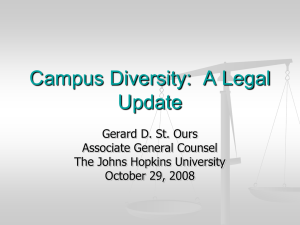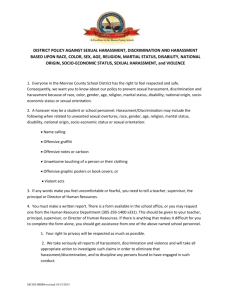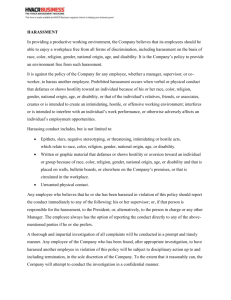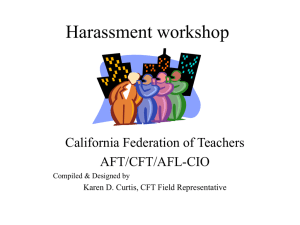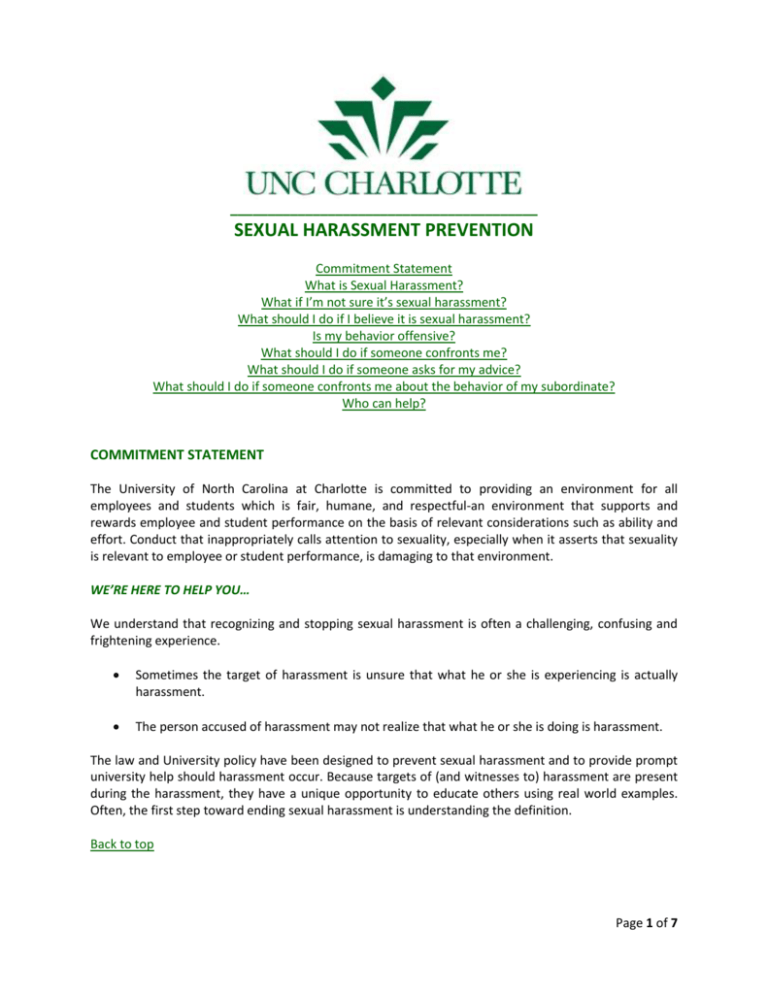
_________________________________________
SEXUAL HARASSMENT PREVENTION
Commitment Statement
What is Sexual Harassment?
What if I’m not sure it’s sexual harassment?
What should I do if I believe it is sexual harassment?
Is my behavior offensive?
What should I do if someone confronts me?
What should I do if someone asks for my advice?
What should I do if someone confronts me about the behavior of my subordinate?
Who can help?
COMMITMENT STATEMENT
The University of North Carolina at Charlotte is committed to providing an environment for all
employees and students which is fair, humane, and respectful-an environment that supports and
rewards employee and student performance on the basis of relevant considerations such as ability and
effort. Conduct that inappropriately calls attention to sexuality, especially when it asserts that sexuality
is relevant to employee or student performance, is damaging to that environment.
WE’RE HERE TO HELP YOU…
We understand that recognizing and stopping sexual harassment is often a challenging, confusing and
frightening experience.
Sometimes the target of harassment is unsure that what he or she is experiencing is actually
harassment.
The person accused of harassment may not realize that what he or she is doing is harassment.
The law and University policy have been designed to prevent sexual harassment and to provide prompt
university help should harassment occur. Because targets of (and witnesses to) harassment are present
during the harassment, they have a unique opportunity to educate others using real world examples.
Often, the first step toward ending sexual harassment is understanding the definition.
Back to top
Page 1 of 7
WHAT IS SEXUAL HARASSMENT?
IN THE WORKPLACE: Unwelcome verbal or physical conduct of a sexual nature, when submission to
such conduct is made a term or condition of employment; submission to or rejection of such conduct is
used as the basis for employment decisions; or such conduct unreasonably interferes with job
performance or creates an intimidating, hostile, or offensive work environment.
IN THE CLASSROOM: Unwelcome sexual advances, requests for sexual favors, or other verbal or physical
conduct of a sexual nature when academic performance (e.g., grades) or participation in an educational
activity or program is conditioned upon submission to such conduct; the conduct unreasonably
interferes with academic performance or creates an intimidating, hostile, abusive or offensive
educational environment.
EXAMPLES OF VERBALLY OFFENSIVE BEHAVIOR:
sexual innuendos and comments
whistling in a suggestive manner
jokes about sex or gender in general
spreading rumors about a the sexual activity or performance of a student or employee
sexual propositions, invitations, or other pressures for sex
implied or overt threats
EXAMPLES OF PHYSICALLY OFFENSIVE BEHAVIOR:
patting, pinching, tickling or other unwanted touching
brushing against the body
attempted or actual kissing
attempted or actual fondling
stalking
coerced sexual intercourse
EXAMPLES OF NON-VERBALLY OFFENSIVE BEHAVIOR:
public display or sharing of pictures or photographs of a sexual nature
e-mails or websites of a sexual nature
Love notes or letters - suggestive comments on memos
Page 2 of 7
Graffiti
Gag Gifts (sex toys, games)
Text messages or social media postings of a sexual nature
Back to top
WHAT IF I’M NOT SURE?
"I don’t like what was said or done, but I’m not sure if this is actually sexual harassment."
Each situation is unique. If you’re not sure, ask yourself these questions:
Was the behavior unwelcome and did/does it make you uncomfortable?
Was the behavior or comment of a sexual nature?
Was the conduct done by someone who can affect your grade or your job?
Was the conduct initiated by another party and not by you?
Do you fear that reporting the conduct will have a negative effect on your professional or educational
goals?
Does enduring the behavior impact your ability to perform your job, operate in the classroom
effectively or otherwise affect your employment and/or educational performance?
If the answer to any of these questions is "yes," the conduct may constitute sexual harassment.
Back to top
WHAT SHOULD I DO IF I BELIEVE IT’S SEXUAL HARASSMENT?
Once you have decided that the behavior(s) may qualify as sexual harassment, you may not be sure about
what to do next or how to do it. The following are some options and suggestions.
OPTION 1
Contact any of the resources listed on the bottom of this webpage for advice, guidance, clarification and
support.
OPTION 2
Meet/Discuss the situation with the offender. Depending on the seriousness of the behavior and whether you
have been intimidated or threatened, you may want to speak with the person who has acted inappropriately.
Sometimes, the other party is unaware that their behavior is offending you and the discussion may alert the
other person and end the unwelcome behavior. The following are suggestions for such a meeting. (If you don’t
Page 3 of 7
feel comfortable meeting with the individual, consider writing them a letter. The following can also serve as a
guideline to help you draft your letter).
1) PREPARE FOR THE MEETING
You will probably want to gather your thoughts and have an idea of what you plan to say before you schedule
a meeting. You may want to write your thoughts down and identify the specific behaviors you would like to
address and how you would like to see the behavior changed. The Director of Employee Relations and
Compliance or the Employee Assistance Program may also be of assistance to you. You may also contact the
Assistant Dean of students for Women’s Programs in the Dean of Students Office or the Dean of Students.
2) SCHEDULE THE MEETING
Confronting someone who you believe is harassing you may be intimidating and frightening. If you feel safe
speaking with the person in private, you may want to establish a meeting time to discuss the situation. If you
do not feel safe discussing the situation in private, you could ask your supervisor to assist you or contact the
Director of Employee Relations and Compliance or the Dean of Students Office for assistance.
Classroom: "Professor Green, I’d like to talk to you after class if you’re available."
Workplace: "Dale, I’d like to schedule a time to speak with you about an issue."
Meetings should occur in a public location (office, dining facility, etc.) during normal working hours when
other faculty, staff and/or students are in the area.
3) THE MEETING
Sample Conversation: You may not be aware of this, but when (describe the specific behavior) occurs, it makes
me feel very uncomfortable.
Describe: As clearly as you are able, describe the behavior or event that you find offensive: What was said or
done? Focus on descriptive rather than evaluative terms.
Example: "When you told that joke about …" rather than "When you harassed me…"
Communicate Feelings: If you are willing, share how you feel; among other things, you may feel bad,
vulnerable, uncomfortable, afraid, or angry.
Example: “I felt uncomfortable when…and it has made me feel awkward when working with you.”
Your needs: If you are willing, explain what you need.
Example: "I need to be treated as an equal in the department."
Request Resolution: Finally, as clearly as you are able, tell the individual exactly what behavior you want to
stop, what amends (if any) you would like, and how you would prefer the person act in the future.
Example: “I want you to stop telling sexually oriented jokes or making degrading comments about women.”
Listen: The individual may offer an explanation for their behavior. If you are willing and able, you may listen to
what they have to say. There might be ways for them to meet their needs (as in the case of offensive
instructive material) without offending you.
Page 4 of 7
If, at any time during the meeting, you feel threatened or unsafe, you should immediately leave the area.
4) AFTER THE MEETING
Document the Conversation:
o
o
o
Type up the conversation -- the date, time, location and a description of the conversation (Who said
what? Who did what? Focus on descriptive rather than evaluative terms).
You may also wish to reflect on how you feel about the conversation -- are you satisfied with it?
Frustrated? -- but this should be separate from the objective description of what happened.)
In the next few weeks, keep a journal and document whether the behavior has continued or stopped.
o If the behavior has continued, note the date, what occurred, and who may have witnessed the
behavior.
5) IF THE BEHAVIOR CONTINUES
If the behavior persists -- the Dean of Students Office, the Human Resources Office, and others at the
university are prepared and trained to help you. Please know that the degree of confidentiality that can be
offered depends on who you speak to, with counseling services providing the greatest degree of
confidentiality available. If confidentiality is a concern for you, you are encouraged to ask what measures will
be taken to protect your identity, and what actions might be taken that might jeopardize your confidentiality
before you share information about the incident or behavior at issue.
Some targets and witnesses may choose not to report. While this may be the easiest option for the individual,
it does not allow the university to address the individual’s concerns so such behavior can be prevented in the
future or recognize a repeated pattern of behavior from a harasser. The university has an obligation and a
desire to end sexual harassment. Therefore, we ask that all harassment be reported so that we may assess the
nature and scope of the problem to better address the issue and take appropriate steps to prevent future
problems.
Back to top
IS MY BEHAVIOR OFFENSIVE?
Because harassment is defined in part by the reaction of the complainant , all members of the University
community are expected to honor reasonable requests to stop offensive behavior. Those who wish to
continue such conduct on the grounds that they believe it to be a valuable or necessary component of the
work environment are expected to seek mediation (with the offended party if the offended party is willing) to
see if alternative, non-offensive behavior can be substituted for the offensive behavior, or to clarify the
purpose of such conduct.
Back to top
WHAT SHOULD I DO IF SOMEONE CONFRONTS ME?
DO
Listen. In particular, listen for the answers to the following questions: What did you do or say that the
other person found offensive? How did your behavior make them feel? What do they need? What
changes in your conduct would they like you to make?
Page 5 of 7
Apologize. Whether you intended it or not, you have offended someone. Saying I’m sorry does not
mean that you intended to be offensive; it is a gesture of good will that can help heal the relationship.
Seek clarification. If you are unsure what part of your conduct was offensive, why it was offensive, or
whether it is harassment, invite the person to talk further with you. You may want to discuss the
situation with a third party present (e.g., a counselor, a member of the Dean of Students or Human
Resources Office, an advisor, your supervisor, etc.)
Seek help. If you have been told several times (by the same person, or by different people) that your
behavior is offensive or harassing, you may need help changing your behavior. There is help available
at the Counseling Center, through the Human Resources Department or through the Dean of Students
Office.
DON’T
Don’t dismiss the concern as a joke or minimize the person’s complaint. Doing so is insulting and
exacerbates the situation.
Don’t accuse the person of being overly sensitive or politically correct.
Don’t attempt to explain or justify your behavior. The other person needs to know that they have
been heard. You may offer an explanation when and if they ask for it.
Don’t continue the objectionable conduct. Not only is this disrespectful of the other person, but it
makes you vulnerable to formal charges and disciplinary action.
Back to top
WHAT SHOULD I DO IF SOMEONE ASKS FOR MY ADVICE?
You can direct the individual to one of the resources listed in this webpage. It is important for the individual
involved to be aware of their options, even if they do not wish to take any action or file a formal complaint.
Back to top
WHAT SHOULD I DO IF SOMEONE CONFRONTS ME ABOUT THE BEHAVIOR OF A SUBORDINATE?
As a supervisor, you are responsible for addressing reports of inappropriate conduct regarding subordinates
(whether or not the person directly reports to you).
For guidance on handling such situations, contact the Director of Employee Relations in the Human Resources
Department.
Back to top
Page 6 of 7
WHO CAN HELP?
You do not have to handle harassment on your own!
If you think that you or another person may be a victim of sexual harassment the following campus offices can
help you evaluate your options.
HUMAN RESOURCES
Title IX Coordinator
Jeanne Madorin
202A King
(704) 687-0659
http://hr.uncc.edu/staff/jeanne-l-madorin-sphr
DEAN OF STUDENTS OFFICE
Title IX Deputy Coordinator
Michele Howard
217 King
(704) 687-0343
http://dso.uncc.edu/staff/howard.html
http://unccdso.orgsync.com/staff
HUMAN RESOURCES
Affirmative Action Officer
Gary Stinnett
222 King
(704) 687-0644
http://hr.uncc.edu/staff/gary-w-stinnett
DEAN OF STUDENTS OFFICE
OFFICE OF WOMEN’S PROGRAMS
Princess King
217 King
(704) 687-0357
http://dso.uncc.edu/staff/Acker.html
http://unccdso.orgsync.com/org/womensprogr
ams
EMPLOYEE ASSISTANCE PROGRAM (EAP)
ComPsych GuidanceResources®
1-877-603-8259
www.guidanceresources.com
http://hr.uncc.edu/employeerelations/employee-assistanceprogram/employee-assistance-program
THE COUNSELING CENTER
158 Atkins
(704) 687-0311
http://counselingcenter.uncc.edu/
http://counselingcenter.uncc.edu/home/needhelp-now
DEPARTMENT OF POLICE AND PUBLIC SAFETY
9151 Cameron Blvd.
(704) 687-8300
http://police.uncc.edu/
STUDENT HEALTH CENTER
Jennifer Cook
(704) 687-7348
http://studenthealth.uncc.edu/jennifer-cookmed-ncc
Back to top
Page 7 of 7

